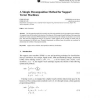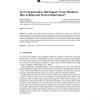3616 search results - page 13 / 724 » Support Tucker Machines |
ML
2002
ACM
13 years 7 months ago
2002
ACM
The decomposition method is currently one of the major methods for solving support vector machines. An important issue of this method is the selection of working sets. In this pape...
ML
2002
ACM
13 years 7 months ago
2002
ACM
The choice of the kernel function is crucial to most applications of support vector machines. In this paper, however, we show that in the case of text classification, term-frequenc...
ICDM
2008
IEEE
14 years 2 months ago
2008
IEEE
We present and discuss several spatiotemporal kernels designed to mine real-life and simulated data in support of drought prediction. We implement and empirically validate these k...
ICDM
2005
IEEE
14 years 1 months ago
2005
IEEE
Abstract— Support vector machines are very accurate classifiers and have been widely used in many applications. However, the training and to a lesser extent prediction time of s...
ICML
2007
IEEE
14 years 8 months ago
2007
IEEE
The large number of genes and the relatively small number of samples are typical characteristics for microarray data. These characteristics pose challenges for both sample classif...


